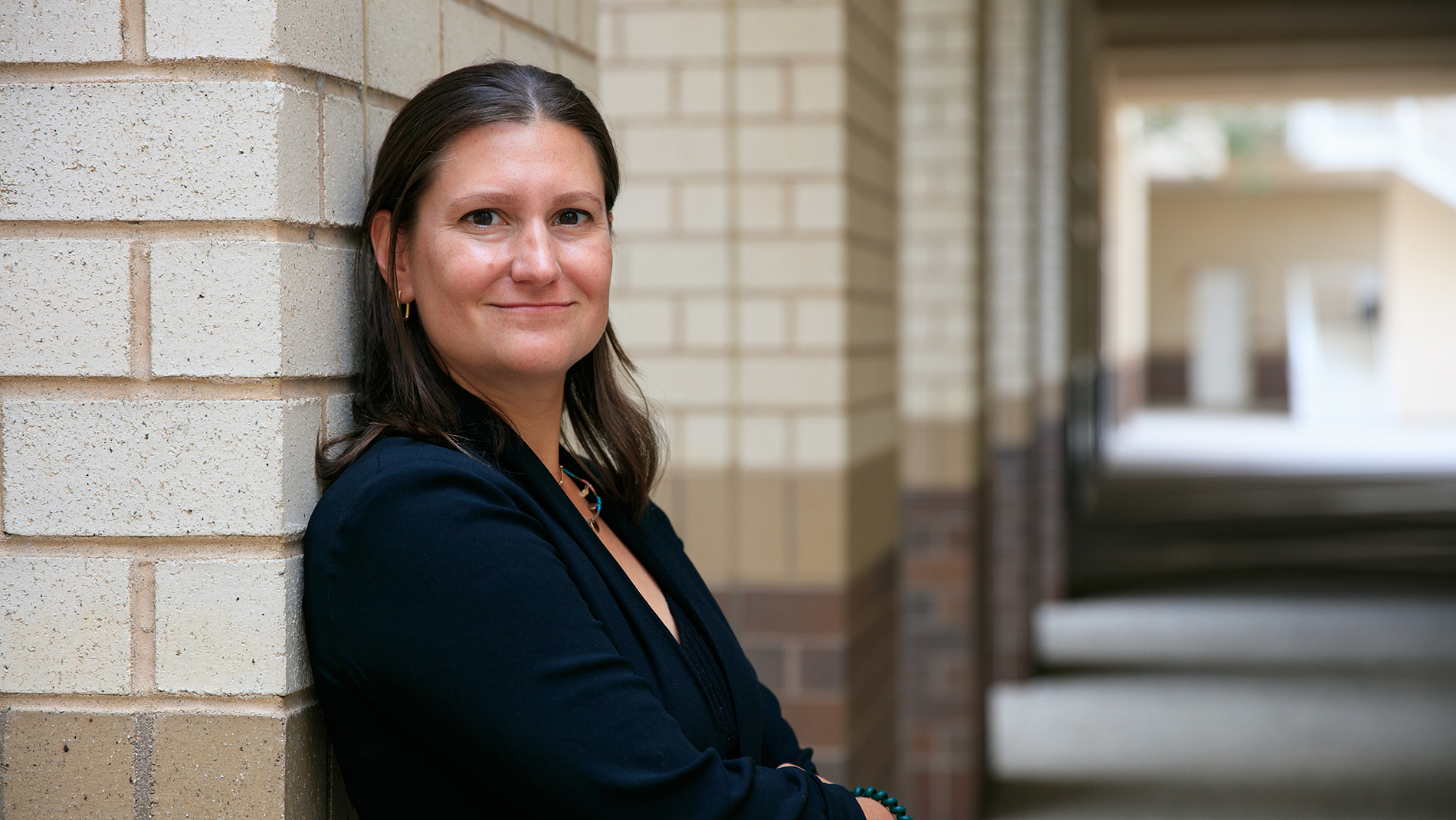
Denise Werchan brings tech innovation to baby brain research
Denise Werchan’s journey to UC Irvine’s Psychology Department began in an unexpected place: computer science.
Now an assistant professor studying how infants learn, she's revolutionizing developmental research by bringing her tech background to one of science’s most enduring mysteries — how babies become such remarkably efficient learners.
“I initially came from a computer science background and got interested in AI and how machines learn,” Werchan explains. “As I started getting into that area, I realized that we still have very limited understanding of how infants learn so rapidly. Humans are the most efficient learners, and I became really interested in trying to understand these processes in early life.”
That curiosity led Werchan from algorithms to infants, and now to UC Irvine, where she's working on new ways to study baby brains in their natural environments.
Werchan’s research stands out not just for what she studies, but how she studies it. Traditional infant research requires families to visit university labs — a barrier that limits participation and real-world applicability. Werchan has developed technology that brings the lab to the baby.
She created OWLET (Online Webcam-Linked Eye Tracker), an open-source system that allows researchers to track infant attention and learning using nothing more than a smartphone or webcam. Such innovation has opened doors to studying babies in their homes, capturing natural behaviors that might never emerge in sterile laboratory settings.
“We can better identify factors that support healthy development and understand how we might be able to reduce risks that can contribute to challenges later in life,” she says.
The Parent-Baby Connection
Werchan’s research reveals that “the early months matter more than we ever imagined, and parents are absolutely central to their baby’s brain development,” she explains.
“We often think that very young babies are resilient to what’s going on around them, but more and more we’re finding that our early environments are so critical for setting the stage for health across the lifespan,” Werchan notes.
Her studies show that parents regulate their babies’ physiology and serve as essential guides for helping their babies to learn, regulate their emotions and adapt to challenges. But, parents facing difficulties may have less capacity to provide such support.
“If a parent is stressed or overwhelmed, or not getting the support that they need, it becomes incredibly difficult to then be able to provide those supports to another person,” Werchan explains.
That understanding has shaped Werchan’s advocacy for policy changes that support families — from paid parental leave to affordable, high-quality childcare. Her research provides the scientific backing for what many parents intuitively know: supporting caregivers ultimately supports children.
Werchan’s own experience as a mother has deepened her research perspective.
“I had my own child three years ago, and I have to say that there is no knowledge in the world that has truly prepared me for experiencing parenthood firsthand,” she says.
Teaching the Next Generation
At UC Irvine, Werchan will teach lifespan development, bringing her unique perspective on how people adapt to challenges throughout life.
“I think that thinking about development across the lifespan and how we adapt to different challenges is something that is incredibly interesting,” she says. “It has so much relevance in students’ lives from thinking of our own childhood and experiences to one day if students themselves become parents.”
Werchan's impressive research portfolio includes nearly 30 publications and multiple major grants, including recent funding from the National Institute on Drug Abuse and the National Institute of Mental Health.
Her work spans from basic questions about infant attention to applied research on how prenatal stress and even COVID-19 exposure affect baby development.
By developing tools that work in homes rather than labs, she’s making it possible to study more diverse populations and capture development as it actually happens — messy, natural and real.
Her latest article — “From Focus to Function: Longitudinal Insights into Infant Attention and Emerging Executive Functions via Remote Webcam Eye Tracking” in the May issue of the journal Developmental Psychology — examines how baby attention predicts future thinking skills.
Werchan and colleagues discovered that how well babies pay attention to things can predict how good they'll be at important thinking skills (like focus and self-control) as they get older.
They found that babies showed similar attention patterns regardless of their family's background; that older babies showed different attention patterns than younger ones; and that babies who showed certain attention patterns were more likely to develop better “executive functions” (important thinking skills like focusing, remembering instructions, and controlling impulses) as they grew.
The research tested babies at home and the technology used made it easier to study infants from all backgrounds, Werchan notes, adding that the study shows that early attention skills are connected to later cognitive abilities regardless of a family's economic situation.
In her vision of science that helps families, she says, the most sophisticated technology serves the most fundamental human relationship: the bond between parent and child.
“Parents are so critical for a baby's development,” she emphasizes. “We need to think about how we can best support infants during this time, and one of the best ways is by thinking of caregivers and ways that we can support caregivers.”
Werchan has a B.S. in psychology from the University of Arizona, Tucson, and an M.S. in psychology and Ph.D. in cognitive science from Brown University. Upon earning her doctoral degree in 2020, she served five years as a postdoctoral research fellow in New York University’s School of Medicine.
— Mimi Ko Cruz
Photo by Han Parker